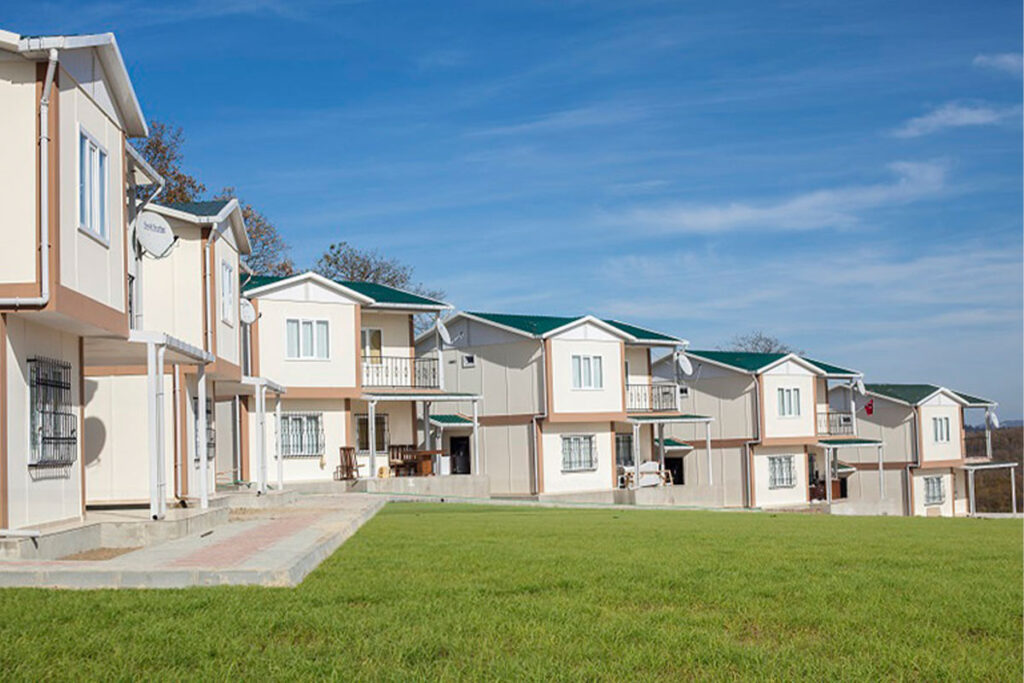
Urban Modular Housing: Transforming City Living Spaces
Imagine a world where the urban landscape adapts as quickly as our modern lifestyles demand. Enter the realm of urban modular housing, a groundbreaking shift in how we conceive and construct our living spaces. At the heart of this transformation lies a commitment to efficiency, sustainability, and innovation, mirroring society’s evolving needs.
The rise of urban modular housing has revolutionized cityscapes, providing dynamic solutions to the challenges of overcrowding, environmental impact, and the increased demand for affordable housing. In this comprehensive guide, we will explore the intricacies of modular housing, understanding its benefits, implementation, and future within the urban environment.

The Concept of Urban Modular Housing
Modular housing denotes the method of constructing buildings where sections, or modules, are prefabricated off-site. This innovative approach enables faster assembly and a lesser carbon footprint compared to traditional methods, as explored in an article on CNBC. As the world becomes increasingly urbanized, solutions like urban modular housing present timely benefits in addressing housing shortages while prioritizing sustainability.
Understanding Modular Design
Modular design encapsulates flexibility in architecture, allowing for scalable solutions tailored to diverse urban needs. With modules constructed in factories, this allows for precise builds that minimize waste, a principle highly regarded in green modular construction approaches. As these modules arrive on-site, they are quickly assembled to form homes, workplaces, or multi-story buildings.
Advantages of Modular Housing
- Reduces construction time significantly by prefabricating parts.
- Decreases waste production, aligning with environmental goals.
- Offers flexibility and adaptability to customize designs.
- Minimizes site disruption due to shorter build times.
Environmental Impact and Sustainability
One of the compelling benefits of urban modular housing is its contribution to sustainable development. It’s an effective solution in addressing today’s environmental concerns by decreasing the carbon footprint of urban developments. Modular construction’s efficiency aligns closely with low carbon housing solutions, promoting responsible urban growth.
Eco-Friendly Materials
Utilization of eco-friendly materials in modular construction occurs more efficiently as production happens in controlled environments, ensuring consistent quality. Materials such as recycled steel, timber frames, and other sustainable options enhance the eco-friendliness of urban modular housing.
Energy Efficiency in Modular Homes
Besides material efficiency, modular homes are designed to be energy-efficient. Integrating energy-saving technologies, such as solar panels and geothermal heating, substantially lowers the energy consumption typical in traditional housing setups, making them an integral part of energy-efficient modular homes.
Urban Modular Housing in Different Cities
As cities adapt to growing populations, urban modular housing provides versatile solutions that can be tailored to diverse cultural and infrastructural needs. Cities worldwide, from New York to Tokyo, are embracing modular buildings to accommodate their unique challenges and opportunities.
Case Studies
Los Angeles, for instance, has been at the forefront of implementing modular housing to tackle homelessness, supported by innovate designs that maximize limited available space. Simultaneously, cities like Amsterdam are opting for modular housing to enhance sustainable living.
Customization for City Living
Another aspect of modular housing is its adaptability to fit different landscapes and aesthetics, allowing urban planners to retain cultural functions while adopting modern methods. Such approaches help in preservation alongside innovation.
Challenges and Future Outlook
Despite its many benefits, urban modular housing does face challenges, predominantly surrounding cost factors, public perception, and policy regulations. However, as technology progresses and benefits become more evident, these hurdles are gradually addressed to embrace broader adaptation.
Building Regulations
Adherence to building regulations can be cumbersome initially, varying drastically across regions. However, ongoing policy reforms, as seen in cities committed to evolving, aim to streamline legal challenges to facilitate rapid modular constructions.
Cost Implications
While upfront costs may be intimidating for developers, long-term cost efficiency and faster return on investment often outweigh initial expenses. With increasing demand for affordable housing, developing economies of scale in modular construction is underway.
Modular Housing and Smart Technology
The future of urban modular housing is intertwined with smart technology, enhancing sustainability through integrated home automation systems. Innovations such as IoT devices offer heightened control over household energy consumption, aligning perfectly with smart modular housing systems.
Integration with IoT
The possibilities broaden with the integration of IoT, leading to efficient energy management and property monitoring. Smart devices, such as programmable thermostats and intelligent lighting, contribute to the eco-friendly nature and livability of modular homes.
Potential for Future Developments
Given their flexibility, modular homes are primed for future integration with cutting-edge technologies as they evolve, fostering a more connected and sustainable urban experience.

Frequently Asked Questions (FAQs)
1. How does urban modular housing reduce construction time?
Modular housing significantly reduces construction time by prefabricating sections or modules in factories, allowing for simultaneous site and building preparations.
2. Is modular housing more cost-effective than traditional builds?
Over time, modular housing can become more cost-effective due to reduced waste, lower on-site construction costs, and shorter project times.
3. Can I customize urban modular housing to my specific needs?
Yes, modular housing offers substantial customization options, allowing the integration of various designs, layouts, and smart technologies to cater to personal preferences.
This article contains affiliate links. We may earn a commission at no extra cost to you.